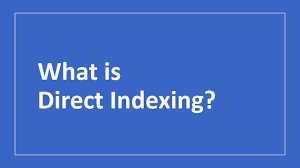Direct Indexing
Aug 11, 2021

“Indexing” is a familiar phrase in investment jargon, and a familiar concept. Money managers structure certain investment vehicles to contain all of the stocks within a particular Wall Street index, such as the Standard & Poor’s 500 stock index. This equity exposure may fit the investment strategy for some investors depending on their risk tolerance, time horizon and goals.
“Direct indexing” is a variation on this idea.
The goals are the same: to match the performance of an index. The methodology differs, however. Instead of buying one investment designed to mirror the composition of an index, the investor buys shares of each stock within the index.
Why would an investor go to such lengths?
To start, the pursuit of tax efficiency. Direct indexing can also lead to a more customized portfolio, giving an investor more ability to add and subtract companies that do or do not align with that investor’s values or market objectives.1
This article is for informational purposes only.
It’s not a replacement for real-life advice, so make sure to consult your tax or accounting professionals before modifying your tax strategy if you are considering direct indexing.
Technological advances have put direct indexing within reach of more investors today. Years ago, it was largely the domain of hands-on types with considerable assets in their portfolios. Now, there are firms that can help with this approach.
Direct indexing can encourage more trades.
A hands-on investor closely scrutinizing performance may want to consider a direct indexing strategy, especially when the equities market turns turbulent. But that can lead to more fees, which may offset the potential benefits of the approach.2
This article is strictly an explanation of the basics of direct indexing, and not an endorsement or recommendation of the strategy. If direct indexing interests you, feel free to explore the approach by consulting a professional before attempting it.
For more insights and resources, be sure to sign up for our Weekly Market Commentary. Follow our YouTube channel where we regularly post our Epic Market Minute videos. Follow us on LinkedIn, or like us on Facebook. And as always, please don’t hesitate to reach out to a dedicated service professional at Epic Capital.
Investing involves risk, including the potential loss of principal. No investment strategy can guarantee a profit or protect against loss in periods of declining values. The S&P 500 Composite Index is an unmanaged index that is considered representative of the overall U.S. stock market. Opinions expressed are subject to change without notice and are not intended as investment advice or to predict future performance. Past performance does not guarantee future results. Consult your financial professional before making any investment decision. This information is designed to provide general information on the subjects covered. It is not, however, intended to provide specific legal or tax advice and cannot be used to avoid tax penalties or to promote, market, or recommend any tax plan or arrangement.
Tags: financial advisor charlotte nc, Investing, Investment Planning, Investment Portfolio, Investments, Personal Finance
More Insights
The S&P 500 strung together 37 record highs this year aboard an 18.1% rally, as of July 10. The advance has largely been powered by a handful of mega cap names tied to technology and/or artificial intelligence. In fact, six stocks — NVIDIA (NVDA), Microsoft (MSFT), Apple (AAPL), Amazon (AMZN), Meta (META), and Alphabet (GOOG/L) … Continue reading “Market Performance is a Tale of Haves & Have-Nots”
Investors are people, and people are often impatient. No one likes to wait in line or wait longer than they have to for something, especially today when so much is just a click or two away.
You can prepare for the transition years in advance. In doing so, you may be better equipped to manage anything unexpected that may come your way.
When developing your estate plan, you can do well by doing good. Leaving money to charity rewards you in many ways. It gives you a sense of personal satisfaction, and it can save you money in estate taxes.
How healthy a retirement do you think you will have? If you can stay active as a senior and curb or avoid certain habits, you could potentially reduce one type of retirement expense. Each year, Fidelity Investments presents an analysis of retiree health care costs. In 2023, Fidelity projected that the average 65-year-old couple would … Continue reading “Retirement Wellness”
Services
Epic Capital provides the following comprehensive financial planning and investment management services: Learn More >


 Top of Page
Top of Page











